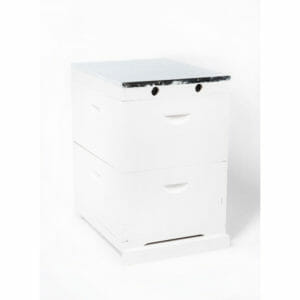A new study in the U.K has looked at the effect that intensive beekeeping practices has on disease rates in honey bees. With bee numbers declining worldwide, honey bee disease rates are of primary concern to both professional and novice beekeepers alike.
Commercial scale beekeepers in particular have to strike a tricky balance. Running a business, they need to optimise honey production at the same time as keeping their honey bee livestock healthy. Today we take a look at what this new study has found and, fortunately, there is some good news.
Intensive beekeeping: The new research
It’s a common assumption that intensive agriculture – where animals or plants are crowded together in high densities – results in higher rates of disease spread. However, a group of British ecologists noted the lack of real testing for this idea. This led them to undertake a research project, and they decided to focus on honey bees.
Mirage News interviewed one of the scientists, Lewis Bartlett, of the University of Exeter and Emory University.
“Crowding of animals or crops – or people – into minimal space usually increases rates of disease spread,” he said.
“We carried out this study because beekeepers were worried about this – especially given the many threats currently causing the decline of bees.
The scientists built multi‐colony models to investigate how “apicultural intensification” really impacts honey bee disease rates at the apiary scale. The resulting research paper, Industrial bees: The impact of apicultural intensification on local disease prevalence, has some reassuring results for the large-scale apiarist.
What did the scientists find?
The scientists’ models tested three linked aspects of apicultural intensification: increased population sizes, changes in population structure and increased between-colony transmission activities (including beekeeper practices like brood transplantation and honey bee activities like drifting).
“To our surprise, our results show it’s very unlikely that crowding of honeybees meaningfully aids the spread of diseases that significantly harm honeybees”, Bartlett told Mirage News.
“Honeybees live in close proximity to each other naturally, and our models show that adding more bees does little to raise disease risk.
“So, beekeepers don’t need to worry about how many bees they keep together as long as there is enough food for them.
“The key is not whether they encounter a disease – it’s whether they are fit and healthy enough to fight it off.”
What does it mean for beekeepers?
The short answer is that if you’re keeping your bees healthy and well fed, and practicing good hive management, beekeeping on an intensive scale should not increase the rates of disease in itself. But maintaining your bees’ ability to fight off disease when it does strike is key.
However, as Bartlett emphasised to Mirage News, it’s important to note that the research only applies to existing honeybee diseases. The findings of the study suggest intensive beekeeping could actually accelerate the spread of new diseases. This is because they found that ‘novel’ pathogens acted differently to more common ones.
Bartlett also emphasises that it is specifically intensified beekeeping (apiculture) that the results of this study apply to. Many other intensive agricultural practices do harms bees, e.g. the use of pesticides and the destruction of habitats for crops.
All in all, this study is a great reminder of just how important good hive management practices are. If you’re looking to scale up and intensify your beekeeping, you should definitely find a mentor who has kept bees at scale professionally for a few years. You can start building a network by joining your local industry association.
Another great way to acquire more skills and experience is by finding some work with a large-scale commercial apiary if available. One of our commercial customers, Andrew Morcom, started out this way only a few years ago and is now running his own successful commercial apiary and hive removal business.
And to keep up to date with new research and beekeeping tips, be sure to check out more of our posts here on The Buzz.

Visit the Bee2Bee online shop for beekeeping equipment and supplies.




